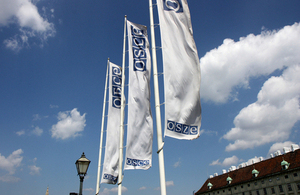UK Statement to the OSCE Special Meeting of the Permanent Council on Ukraine
Ambassador Dominic Schroeder's statement to the OSCE Special Meeting of the Permanent Council on the recent events in Ukraine

OSCE flags flying in Vienna, Austria
Organisation for Security and Co-operation in Europe, Vienna, Austria.
Tuesday 3rd March, 2014
Madame Chair,
I fully support the statement made on behalf of the European Union and its Member States. I would like to add some remarks in a national capacity.
The United Kingdom remains deeply concerned by the events in Ukraine. As a permanent member of the UN Security Council, as a member of the G7, NATO and the EU, and as a signatory of the 1994 Budapest Memorandum, the United Kingdom joins others in condemning the Russian Federation’s clear violation of the sovereignty and territorial integrity of Ukraine. This is in clear contravention of Russia’s obligations under the UN Charter and the spirit and principles of the OSCE.
We have therefore sought an immediate and full explanation from the Russian Federation for the decision to authorise military action on sovereign Ukrainian soil, and of the basis for it under international law. My Prime Minister has called on all parties to think carefully about their actions and work to lower, not escalate, tensions.
My Foreign Secretary is in Kyiv today. He has today reiterated the urgent need for direct dialogue between Russia and Ukraine. He has earlier underlined the importance of calming tensions and for the Russian authorities to use all opportunities to resume such a dialogue with Ukraine, whether through political or military channels, or under the auspices of the OSCE.
The UK Government supports the Ukrainian Government’s request for urgent consultations in accordance with the 1994 Budapest Memorandum signed by the UK, US, Russia and Ukraine. We see no reason why these consultations should not take place immediately. We warmly welcome the idea of a mission to Ukraine. The Canadian ideas distributed yesterday are an important and timely contribution to the necessary urgent thinking about this. We are grateful to Ambassador Guldimann for his focus on this. We will offer our full support as this idea is developed in the OSCE and/or in other fora with a view to early deployment.
We welcome the visit of the High Commissioner for National Minorities, Astrid Thors, to Ukraine. This is a necessary and important step. There is much that she can usefully contribute in the current circumstances. Not least, to observe the real situation for the rights of persons belonging to national minorities and to assist the Government in ensuring they are indeed being properly protected. We welcome and support the engagement of all OSCE Institutions and Executive Structures.
We welcome Ambassador Guldimann. His mission on behalf of the Chairman in Office is an important one, which we fully support, and we look forward to close cooperation with him. Although our attention is currently properly directed to the current direct threats to security in our region, there is a great deal else that needs to be done to support the Government of Ukraine in the difficult transition on which it is now embarking. We continue to support work to develop options for OSCE assistance to the Government on the broad agenda of issues which it needs urgently to address.
Madame Chair,
On 23 January, our distinguished Russian colleague recalled the UN resolution on the Olympic Truce - and as the Paralympic Games begin this week in Sochi, the Olympic Truce remains in force. He said, and I quote, “The Olympic Games are designed to depoliticize the most pressing international problems and create additional opportunities for building bridges between countries and nations.” End of quote. That could apply with equal validity to the OSCE. And so I urge Russia to take up the opportunities that the OSCE can offer to de-escalate this most pressing of international problems and to resolve any concerns they have exclusively through political means.